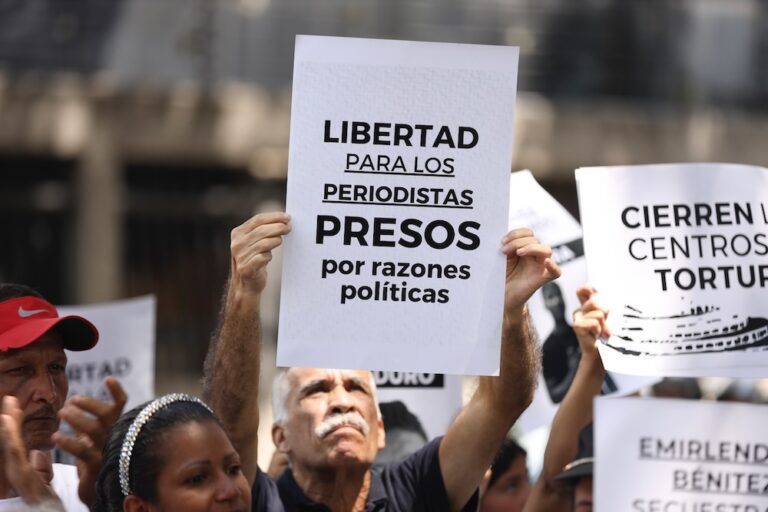(WAN/IFEX) – The following is a 1 June 2008 WAN press release: Offending, Shocking, Disturbing - A Free Press Right? Göteborg, Sweden, 1 June 2008 – Cartoonists and journalists from the Arab world, Europe and the United States today (Sunday) defended their right to offend, shock and disturb their audiences, and presented evidence that the […]
(WAN/IFEX) – The following is a 1 June 2008 WAN press release:
Offending, Shocking, Disturbing - A Free Press Right?
Göteborg, Sweden, 1 June 2008 – Cartoonists and journalists from the Arab world, Europe and the United States today (Sunday) defended their right to offend, shock and disturb their audiences, and presented evidence that the Danish cartoon crisis was manipulated by repressive governments to further restrict freedom of expression.
“If we no longer have the right to ridicule those who inflict terror on us, that’s a problem,” said Philippe Val, a columnist and editorial director of the French satirical weekly Charlie Hebdo, in a seminar in Göteborg, Sweden, organised by the World Association of Newspapers on the eve of the World Newspaper Congress and World Editors Forum, the global meetings of the world’s press.
Mr Val, whose newspaper successfully defended itself in a lawsuit brought by Muslim organisations in France after it re-published the Danish cartoons, was speaking at a round-table discussion on whether limits should be accepted on the publication of content that offends, shocks, insults or disturbs. The Danish cartoons and subsequent caricatures have caused demonstrations throughout the Arab world, which speakers on Sunday said were manipulated by governments to further repress freedom of expression.
“The authorities did not hesitate to use this international scandal to silence the voice of an independent newspaper that criticised them,” said Ali Amar, publisher of Le Journal Hebdomadaire in Morocco, which was the victim of government-organised anti-cartoon demonstrations even though it did not re-publish the cartoons.
Ali Dilem, a renowned Algerian cartoonist with a well-established international reputation, has faced 50 trials because of his drawings that often skewer Algerian leaders and Arab government policies. “I don’t have problems with the Algerians I meet. It’s more with the authorities,” he said.
Miklos Haraszti, representative on Freedom of the Media for the Organisation for Security and Cooperation in Europe, who chaired the session, said: “the cartoon issue itself is still continuing. We’ve seen plenty of new cases which go back to the sensitivity aroused by these cartoons. But I would say this is being used mostly as a pretext. There are trials in the Muslim world against all kinds of caricatures. The sensitivity, of course, might be authoritarian, not necessarily religious.”
Speakers recognised that such cartoons can, and often do, offend, but they said freedom to publish is necessary.
“I don’t think that shocking or offending should be the goal itself. If you’re going to offend people, it must be at the right place, at the right time, for the right reason. But it must be possible. And it must be legal,” said Ulf Johannson, editor-in-chief of Nerike Allehanda in Sweden, who faced death threats and demonstrations after his newspaper published a caricature that was rejected by a local exhibition because of fear of repercussions.
Mr Val of Charlie Hebdo said it was impossible to understand the Muslim demonstrations without seeing the cartoons. “Quite simply, it was a way of informing people about the scandal. Otherwise they would only hear about the scandal without knowing what it was about, which is incredible in a democracy.”
Jehad Momani, former editor-in-chief of Shihane in Jordan, used the same reasoning for re-publishing the cartoons and was arrested on criminal charges of blasphemy and “incitement to violence.”
“I published these caricatures because it was my job to inform people and to present the truth about these caricatures,” he said. “I was punished because I attempted to present a rational response and to avoid a political and cultural conflict between our civilisations. I believe I was correct when I published these excerpts to show people why Moslems are arising around the world.”
More on the round table can be found at:
http://www.wansweden2008.com/articles.php?id=154
The World Newspaper Congress and World Editors Forum, which opens Monday, has brought 1,800 newspaper publishers, chief editors and other senior newspaper executives from 113 countries to Göteborg. Full details at: http://www.wansweden2008.com
The Paris-based WAN, the global organisation for the newspaper industry, defends and promotes press freedom and the professional and business interests of newspapers world-wide. Representing 18,000 newspapers, its membership includes 77 national newspaper associations, newspaper companies and individual newspaper executives in 102 countries, 12 news agencies and 11 regional and world-wide press groups.
For further information on the Danish cartoon crisis, see:
http://ifex.org/es/content/view/full/90719


